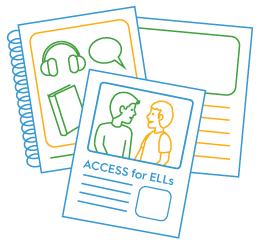Resources/Recursos
Featured Resources



All resources/Todos los recursos
Filter resources by:
Resources/Recursos
Establishing a Definition of English Learners With Significant Cognitive Disabilities
This ALTELLA Research Brief defines “English learners with significant cognitive disabilities” and explores related key concepts.
Resource DetailsReleased September 2025
ALTELLA Project Individual Characteristics Questionnaire
This Individual Characteristics Questionnaire was developed in 2018 by the ALTELLA project. Anyone can use the ALTELLA Individual Characteristics Questionnaire (fillable PDF) to collect characteristic information on a multilingual learner with a disability.
Note: A slightly different Individual Characteristics Questionnaire is part of the WIDA Alternate ACCESS test materials.
Resource Details View Download NowReleased September 2025
Nonverbal Communication in Diverse Classrooms: Intercultural Competence Considerations for Supporting English Learners With Significant Cognitive Disabilities
Use this ALTELLA Research Brief to learn about nonverbal communication, which is an important component of communication for multilingual learners with significant cognitive disabilities. The brief explores the individual cultural differences in nonverbal communication for these students.
Resource DetailsReleased September 2025
WIDA Self-Paced Workshops Flyer
WIDA offers Professional Learning that you can complete when you want, where you want, and at your own pace. Ready to get started? This resource will show you what offerings are available and how you can access them.
Resource Details View Download NowReleased September 2025
Educator Questions
This resource suggests questions you can use for your ongoing conversations with other educators to help build trust and collaborative relationships with multilingual students, families and communities.
For more context around this resource, please visit the Building Trust in Action Snapshot.
Resource Details View Download NowReleased August 2025
Community Member Questions (multiple languages)
This resource suggests questions you can use for your ongoing conversations with community members to help build trust and collaborative relationships.
Resource DetailsReleased August 2025
Educators as Advocates: Advocating for and With Multilingual Families (multiple languages)
This resource offers topic areas and sample questions that educators can ask families to strengthen their collaborative advocacy efforts and engage in two-way, meaningful conversations.
Resource DetailsReleased August 2025
Families as Advocates: Advocating for My Multilingual Learner (multiple languages)
This resource offers topic areas and sample questions that families can ask educators to strengthen their collaborative advocacy efforts and engage in two-way, meaningful conversations.
Resource DetailsReleased August 2025
Family Questions (multiple languages)
This resource suggests questions you can use for your ongoing conversations with multilingual families to help build trust and collaborative relationships.
Resource DetailsReleased August 2025
Video: A Sample Teacher-Parent Conversation
This video models a supportive conversation between a teacher and a Spanish-speaking parent to show how educators and families can advocate for inclusive practices that center family perspectives. The video features people speaking in Spanish.
Resource DetailsReleased August 2025
Monthly Coffee Chats: Building Trust With Multilingual Families
This resource offers guidance for starting and sustaining monthly coffee chats with families of multilingual learners. Use the information to get started with coffee chats in your context or to reflect on similar activities that you already do. For more context around this resource, please visit the Building Trust in Action Snapshot.
Resource Details View Download NowReleased August 2025
Student Questions (multiple languages)
This resource suggests questions you can use for your ongoing conversations with multilingual learners to help build trust and collaborative relationships.
Resource DetailsReleased August 2025
Awareness in Action
This WIDA Snapshot offers an introduction to awareness, one of the six ABCs of Family and Community Engagement. The ABCs of Family and Community Engagement are six key considerations for educators who support multilingual learners and their families and communities.
Resource DetailsReleased August 2025
Advocacy in Action
This WIDA Snapshot offers an introduction to advocacy, one of the six ABCs of Family and Community Engagement. The ABCs of Family and Community Engagement are six key considerations for educators who support multilingual learners and their families and communities.
Resource DetailsReleased August 2025
Building Trust in Action
This WIDA Snapshot offers an introduction to building trust, one of the six ABCs of Family and Community Engagement. The ABCs of Family and Community Engagement are six key considerations for educators who support multilingual learners and their families and communities.
Resource DetailsReleased August 2025
Plan Curriculum, Instruction and Classroom Assessment With the WIDA Language Charts
This WIDA Snapshot provides guidance on how to use the WIDA Language Charts to collaborate and plan instruction.
Resource DetailsReleased August 2025
Literature Synopsis: ABCs of Family and Community Engagement
Use this research-based summary to dive deeper into the evidence underpinning six key considerations of family and community engagement — Awareness, Advocacy, Building Trust, Breaking Barriers, Collaboration, and Connection to Learning. This resource offers a concise synthesis of scholarly literature about each key consideration along with guiding questions you can use individually or collaboratively with your team.
Review this synopsis along with the Infographic and Look-Fors: ABCs of Family and Community Engagement. Together, they provide a visual roadmap for action plus a foundation of evidence to support conversations and decisions.
For more practical resources about the ABCs, please visit the Engaging Families and Communities page.
Resource Details View Download NowReleased August 2025
La pracademia en la práctica: integrando la investigación y la docencia en el salón de clases
Este resumen de investigación explora casos de estudio específicos en relación a la pracademia y como se ve en la práctica. Los casos presentados ilustran que la investigación en el aula es factible y tiene un gran impacto. Los educadores tienen mucho que aportar significativamente a la investigación académica a través de su trabajo. Sin embargo, estos ejemplos también conciencian sobre el hecho de que si bien se trata de educadores y esfuerzos ejemplares es necesario implementar cambios sistémicos para abordar los desafíos que podrá enfrentar el universo de educadores de aula y que no todos los ejemplos tendrán el mismo éxito que los que hemos leído sin los recursos y apoyo necesarios.
Resource DetailsReleased July 2025
Pracademics in Practice: Integrating Research and Teaching in the Classroom
This research brief explores specific case studies on what pracademics looks in practice. The cases presented illustrate that research within the classroom is both feasible and impactful. Educators have a lot to meaningfully contribute to scholarship through their work. However, these examples also raise awareness on the fact that while these are exemplary educators and efforts, there are systemic changes that need to occur to address the challenges that the general educator population could face and that not all examples can be successful if the needed supports are not in place.
Resource DetailsReleased July 2025
WIDA Alternate Screener Accommodations Checklist
This checklist can be used for tracking the accommodations a student receives on WIDA Alternate Screener.
Resource Details View Download NowReleased July 2025




